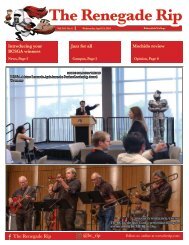Renegade Rip Issue 1 Feb. 10, 2021
Renegade Rip Spring 2021 Issue 1 Feb. 10, 2021
Renegade Rip Spring 2021 Issue 1 Feb. 10, 2021
- No tags were found...
Create successful ePaper yourself
Turn your PDF publications into a flip-book with our unique Google optimized e-Paper software.
News<br />
Page 3<br />
The <strong>Renegade</strong> <strong>Rip</strong> www.therip.com<br />
Wednesday, <strong>Feb</strong>. <strong>10</strong>, <strong>2021</strong><br />
Kern County Democratic leaders<br />
call on Kevin McCarthy to resign<br />
By Charr Davenport<br />
Reporter<br />
The Kern County Democratic Central Committee<br />
and the Democratic Women of Kern joined<br />
together, on Jan. 11, to call on local Republican<br />
Congressman and House Minority Leader Kevin<br />
McCarthy to resign due to his influence on the riots<br />
at the Capitol on Jan. 6.<br />
“The mayhem that terrorized the Capitol was<br />
incited by the President and his allies, who fed<br />
their supporters a steady diet of misinformation<br />
and dangerous rhetoric. Bakersfield Representative<br />
Kevin McCarthy, in his role as House Minority<br />
Leader, has been among the most vocal and influential<br />
members of Congress to engage in this type<br />
of behavior,” the local groups said in a joint press<br />
release. The release also accused McCarthy of violating<br />
Section 3 of the Fourteenth Amendment to<br />
the Constitution as well as his own Oath of Office.<br />
“We called on his resignation because he does<br />
not represent the people anymore,” said Christian<br />
Romo, Chair for the Kern County Democratic<br />
Central Committee. “He represents Donald<br />
Trump and his billionaire friends.”<br />
According to Romo, the Kern County Democratic<br />
Party has plans to keep the pressure on<br />
McCarthy until he resigns, as well as plans for if<br />
he does not resign. “The only way to remove him<br />
from office would be getting a 2/3 vote from his<br />
colleagues in the House. We want to pursue that<br />
route as well. If he doesn’t resign, we’re going to<br />
ask for his colleagues to take him out.”<br />
Robin Walters, president of the Democratic<br />
Women of Kern, wants McCarthy to take responsibility<br />
for his part in the riots. “I think he [McCarthy]<br />
and his kind are to blame. If you can’t tell<br />
people the truth, if you continue to allow the incitement<br />
of racism and crazy conspiracy theories<br />
and the false notion, absolutely false, that this election<br />
was not secure, you are responsible. I would<br />
say he was responsible because he spoke out about<br />
that.” Despite that, Walters does not think McCarthy<br />
will resign. She is, however, hopeful for the<br />
future of Kern County. “I think there are lots of<br />
people in Kern County, more than you know, that<br />
are Democrats. I also think there are lots of thinking<br />
Republicans. I don’t think the thoughtful Republicans<br />
in this town abide by the Trump lies and<br />
the McCarthy groveling at Trump’s feet. I don’t<br />
think they like people that are just after personal<br />
power and personal gain.”<br />
Agreeing with Walters is Elise Modrovich, who<br />
is currently in the running for Assembly District<br />
26. “He [McCarthy] won’t resign… Right now<br />
he’s trying to work his way back into his power position.<br />
We have an opportunity, but I don’t know<br />
how long we’ll have it. There is a chink in his armor,<br />
so if we can get a strong candidate, we have a<br />
shot at Kevin.”<br />
Not everyone in the Kern County Democratic<br />
Party is happy with the call, however. Julie Solis,<br />
who ran for the 34th District in 2020 and was recently<br />
arrested for trespassing at McCarthy’s office<br />
on Jan. 11, does not think the party is doing<br />
enough. “I think that just releasing a statement<br />
that says ‘Resign,’ although it is appreciated, isn’t<br />
enough. If you really want to make an impact,<br />
then we need to start mobilizing. We need action.”<br />
As of <strong>Feb</strong>. 4, Kevin McCarthy has not yet made<br />
a response to the calls for him to resign.<br />
BC webinar explores<br />
the power of gaming<br />
Discussing racial and<br />
gender equity at BC<br />
By Jaylene Collins<br />
Reporter<br />
Bakersfield College’s Student<br />
Government Association (BCSGA)<br />
held a webinar via Zoom with the<br />
Southern University of California<br />
(SUC) professor and video-game<br />
executive Gordon Bellamy, last<br />
Tuesday, <strong>Feb</strong>. 2.<br />
The theme of the webinar was<br />
“The Power of Gaming.” Bellamy<br />
spoke about his career path, education<br />
programs in the gaming industry,<br />
and the importance of gaming.<br />
Throughout the webinar, Bellamy<br />
also answered various questions<br />
from the audience.<br />
Coming from a family of lawyers,<br />
Bellamy spoke of how he was<br />
expected to become one himself.<br />
Thus, Bellamy went to college to<br />
pursue a career as an attorney but<br />
due to lack of interest, his career<br />
path changed.<br />
Having a love for sports and video<br />
games, Bellamy decided he wanted<br />
to work at the video game company,<br />
Electronic Arts (EA) or ESPN.<br />
Eventually, Bellamy landed a job at<br />
EA and worked his way up the ladder.<br />
Most notably, Bellamy worked<br />
as the lead designer twice for the<br />
popular game, “Madden NFL.”<br />
He later left EA and helped to start<br />
Z-Axis, a smaller video game company<br />
that created extreme sports<br />
games. Z-Axis was later bought by<br />
video game publisher, Activision.<br />
As an educator, Bellamy now<br />
teaches at USC. He is a faculty<br />
member for USC Games, a program<br />
that helps students who want<br />
a career in the gaming industry.<br />
“You cannot wait for the world to<br />
act on you,” Bellamy stated. “If you<br />
want to get into the game industry,<br />
then you have to act on the world<br />
and start making games.”<br />
At USC Games, there is a video<br />
game design track and video game<br />
engineering tack undergrad and<br />
masters students are able to take,<br />
as well as extracurriculars such as<br />
a course on how gaming streaming<br />
services work and esports teams students<br />
can join.<br />
Bellamy said his favorite part of<br />
his job was being able to watch his<br />
students grow.<br />
“The people who I’ve mentored<br />
who have gone on to do and create<br />
things that I couldn’t even imagine.<br />
That’s my favorite thing, to see<br />
them thrive and grow is super fulfilling.<br />
Seeing people be their own best<br />
selves,” Bellamy said.<br />
Bellamy then spoke about the importance<br />
video games played in his<br />
life. Besides the fact Bellamy worked<br />
as a video game executive, he said<br />
games were always important to<br />
him.<br />
“Games matter to me so much<br />
because games have rules that we<br />
all share,” Bellamy explained. “For<br />
me, games were always a default<br />
space where I could simply be and<br />
be as good as I was and share an<br />
experience with people who are all<br />
navigating the same set of rules. We<br />
look for default set spaces where we<br />
could be who we are as unique individuals.”<br />
Then he spoke of how important<br />
it was for people to be able to find<br />
that unique set space for themselves<br />
in video games.<br />
The webinar then came to a close<br />
after Bellamy answered a few questions.<br />
The full webinar is available to<br />
watch on the BCSGA Facebook.<br />
By Brisa Flores<br />
Reporter<br />
A webinar with three academic<br />
senate leaders was held to discuss<br />
their views about their racial and gender<br />
equity perspectives in the public<br />
higher education, on Jan. 29.<br />
In this four-part conversation series,<br />
Lark Park, director of the California<br />
Education Learning Lab, was joined<br />
with Academic Senate leaders Dr.<br />
Dolores Davison, Dr. Robert Keith<br />
Collins, and Dr. Mary Gauvain.<br />
The California Education Learning<br />
Lab was passed as a bill in 2018<br />
to close gaps between equity and<br />
achievements in students who specifically<br />
want a STEM career.<br />
Dr. Davison is the President of the<br />
Academic Senate for the California<br />
Community Colleges and a Professor<br />
of History and Women’s Studies<br />
at Foothill College. Dr. Robert Keith<br />
Collins is the Chair of the Academic<br />
Senate of the California State<br />
University, an Associate Professor of<br />
American Indian Studies at San Francisco<br />
State University, and a four-field<br />
trained anthropologist. Dr. Gauvain,<br />
is the Chair of the Academic Senate<br />
of the University of California and a<br />
Professor of Psychology for the University<br />
of California Riverside.<br />
The three guests answered a series<br />
of questions about the topic of racial<br />
and gender equity.<br />
One of Park’s first opening questions<br />
to the senate leaders was when<br />
talking about race and gender equity<br />
about students, what they really talked<br />
about, and faculty talking about<br />
the same thing.<br />
“Equity is really about providing<br />
students with the opportunity and<br />
support that they can succeed,” stated<br />
by Dr. Gauvain.<br />
Gauvain then went on to say that<br />
students should be able to succeed<br />
and do what they want to do and not<br />
be tied restrained by society,”Equity<br />
really just is a fundamental core value,”<br />
she added.<br />
Dr. Collins explained how it is important<br />
for faculty to use their voices<br />
to bring up the issues about “fairness<br />
and impartiality.”<br />
“Faculty are really using the classroom<br />
to engage these issues not only<br />
in terms of research that helps to<br />
grow fields but also so that they turn<br />
into pedagogical resources,” Dr. Collins<br />
said. He explained this will help<br />
students know what fairness really is<br />
and how the lack thereof can cause<br />
more inequality and impartiality in<br />
an environment like school.<br />
Dr. Davinson gave her perspective<br />
as the President of the community<br />
colleges, “I would argue that at any<br />
of our 115 degree-granting institutions<br />
and 116th which is a fully online<br />
college you will see faculty making<br />
significant changes throughout the<br />
institutions to ensure that equity is a<br />
central focus of everything they do in<br />
and out of the classroom, the athletic<br />
field, the counseling office, the lab,<br />
wherever they are.”<br />
The panelists continue to answer<br />
questions from their perspectives<br />
from the campuses they work at and<br />
how their campuses implement the<br />
idea or topic of race and gender equity<br />
to be talked about or minimize<br />
the gaps caused by and h0w similar<br />
the ideas of these campuses are even<br />
if they are from different campuses.<br />
Dr. Davinson brought up how faculty<br />
should be involved in this discussion<br />
and the student services professionals<br />
because they are the ones that students<br />
usually see and communicate<br />
with more to be able to minimize this<br />
gap with race and gender.<br />
They also discussed what keeps<br />
them inspired during quarantine and<br />
what they admire about their comrades.


















